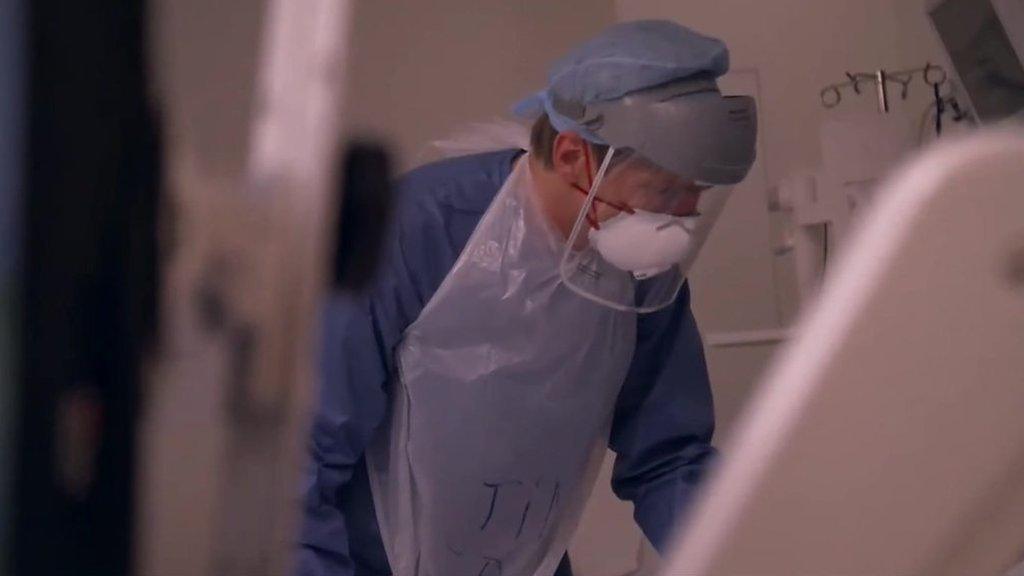Doctors and coronavirus: ‘How can we not be afraid?’
- Published
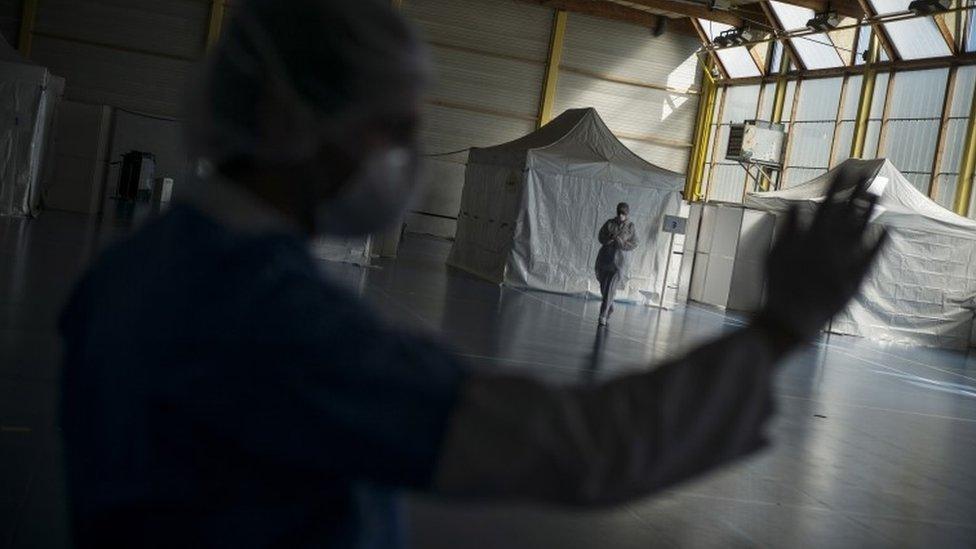
The coronavirus pandemic is taking a heavy toll on the healthcare workers around the world battling to contain it.
Many fear for their lives amid limited supplies of essential protective equipment. The virus has also changed their relationships with their patients, co-workers and families, and some are struggling under the psychological weight of the crisis.
No global figures are available, but individual country data highlight the risks they are facing in treating patients, with thousands of healthcare professionals infected in countries like Italy, Spain and the US.
We spoke to five healthcare workers, all women, in some of the world's worst-affected countries about the challenges they are facing. Some who are barred from speaking publicly asked to remain anonymous.

Paediatric intensive care fellow in London, UK
Before the coronavirus came we would see masks and personal protective equipment (PPE) lying on every bed space in our intensive care unit, but as of now they usually stay locked in a cupboard and you have to go in and fetch them.
I am concerned about the risks involved. The most important thing is we are probably getting exposed a number of times, as opposed to the general public who probably have exposure once. Despite having PPE, there is still a chance that, if you're doing procedures that generate aerosols, you are at risk of getting exposed and for us it's probably going to be multiple times instead of just once.
Since I live with my husband, a medic who works in Covid-positive wards, my main concern is that it's probably going to be us getting the thing into each other at some point.
The BBC's Fergus Walsh meets medics treating patients with Covid-19 at University College Hospital London
Psychologically it's hard because the only work we're doing is high-risk work as of now.
Our shifts have become more frequent; we're doing more night shifts; we're working every other weekend; and all our annual leave has been cancelled. So it's hard on the work front and the sad thing is probably that we don't have anything to get that stress off us as there's no way we can relax.
You either work in a high-risk situation and get stressed or you are just at home doing nothing so it's not a nice situation to be in at the moment.

Sara Gering - ICU nurse, Seattle, US
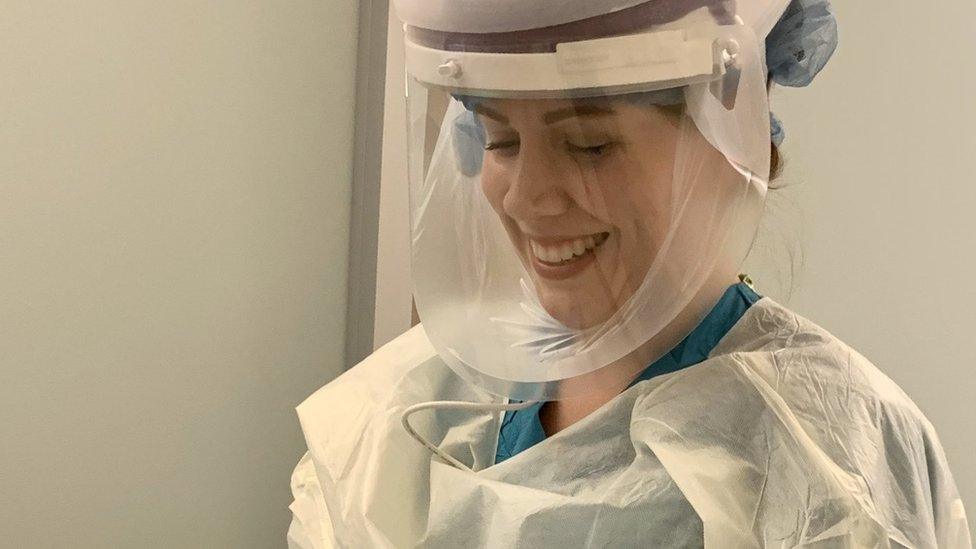
The first few patients we were doing Ebola-style. We were throwing out masks in quantities and then it was realised as we were coming to the end of our supplies that, oh no, there's no new stuff coming in because the distribution's impacted so we're scrambling to re-use the last bits of what we have on hand.
There have been a lot of healthcare workers getting sick around the world so I think there's justifiable concern.
I'm concerned for my colleagues who are immuno-compromised or have underlying respiratory issues. We're doing our best to keep those nurses out of the rooms. I'm fortunate that I don't have underlying health conditions.
I worry about taking it home to my husband and I've kind of wondered if I should move into the guest bedroom and try not to come within six feet of him. But so far we're just continuing on with life as normal.
We still are not going to sacrifice ourselves and run in without PPE. I refuse to do that. If we run out of masks, I don't know what I'll do. It'll be a huge ethical dilemma. I feel that my commitment to my profession does not extend to sacrificing my own life and doing knowingly needlessly reckless things. My employer has a responsibility to continue providing protective equipment to keep nurses safe.

Nurse in Madrid, Spain
I feel lucky because, at the moment, I can wear a mask and a new disposable gown every day that I go to work (although the latter are already beginning to be sterilised).
I have to stay in the same clothes all shift and protect them with a surgical mask and a semi-transparent gown, which is what we discard when leaving the room. Many colleagues from other units and other hospitals sometimes do not even have that and share on social media how gowns and shoes are being made with garbage bags, and protective visors with all kinds of gadgets.
We see at the bedside the most serious consequences of this disease. How can we not be afraid of it?
Strangely enough, when I least think about everything that surrounds Covid-19 is when I am working. I suppose this is a defence mechanism that I have created to cope with this situation. I focus on taking care of my patients.
Once the shift ends, this defence mechanism "turns off" and I think about the risks I'm exposing myself to day after day, and I do fear the possibility of finding myself in the future in the same situation my patients are in. That this could happen to me.
After work I take off everything that has been in contact with the hospital at the entrance and go to the shower and clean - clean everything. I live alone but other colleagues isolate themselves from their family in their own home because of the risk of infecting them.
I watch the news and I get angry, I get depressed, I despair. You listen to people's applause from their balconies . Sometimes I cry. I don't know if I am grateful or frustrated. There are better and worse days. Lately it has been harder for me to sleep.

Resident doctor in Lombardy, Italy
The work you are doing in the day is no different.
The difference is that everything is much slower because you have to dress up every time - we have masks and gloves and something to put over our eyes and something like a jumpsuit.
You have to wear them all the time. You cannot remove them. So that's why we're working six hours in a row and every six hours we need to change. Once you start working, you have to work until the end - you cannot eat or go to the bathroom or drink or anything.
You cannot go out for dinner or to the park. Inside the hospital you cannot have a coffee with colleagues. You just go there, work and go home.
The relationship with the patients has become totally different... I used to stay a little bit and talk with the patient to try to create a relationship but now you can't. The patient cannot hear because the oxygen is very loud and also because you don't want to stay in the room longer than you have to. Besides, it's very hot in all that plastic you have to wear. Also you can only talk to relatives on the phone.
You feel like you're a doctor in wartime.
We don't have much time to stop and think about it because we're working. We're going to think about it all later probably. It always happens when you're in an emergency, you don't think - you just act.

Michelle Au - anaesthesiologist in Atlanta, US
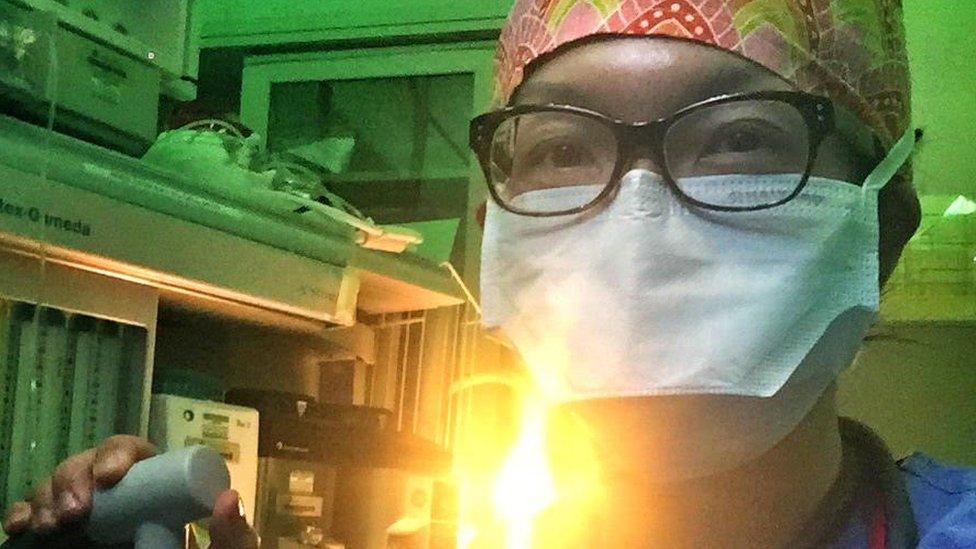
So far, I've had access to what I need every time I have to take care of a patient. There have been times when I've had to reuse items and I worried that in the act of taking off a possibly contaminated item and putting it back on I am contaminating myself.
You can't see the particles, it's not like red paint where you'd be like "oh I got some on myself". It's not a spill, there's no alarm that sounds. You're very concerned about invisible contamination and that in the act of trying to do good you are doing harm.
Many healthcare practitioners around the country are starting to contract this disease, and it makes sense. We are uniquely vulnerable. And many of us, at least the people I've spoken to, are speaking in terms of not if but when we will contract it. We're basically behaving with the assumption that many of us will contract it.
We've had a will for more than a decade because we have children - it was a thing we had just in case, it's a thing you do to be a responsible adult - but I don't think we have really viewed it as a real possibility until now. And now we have reworked it.
I have moved down to the basement so I'm separated from my family - separate bedroom, separate bathroom. I'm semi-quarantining my personal items so that, if I do need to quarantine, the provisions are already in place. It's reasonably likely that if someone in the family gets it, it's going to be me.
Interviews have been edited for length and clarity.

A SIMPLE GUIDE: How do I protect myself?
AVOIDING CONTACT: The rules on self-isolation and exercise
HOPE AND LOSS: Your coronavirus stories
VIDEO: The 20-second hand wash

- Published5 April 2020
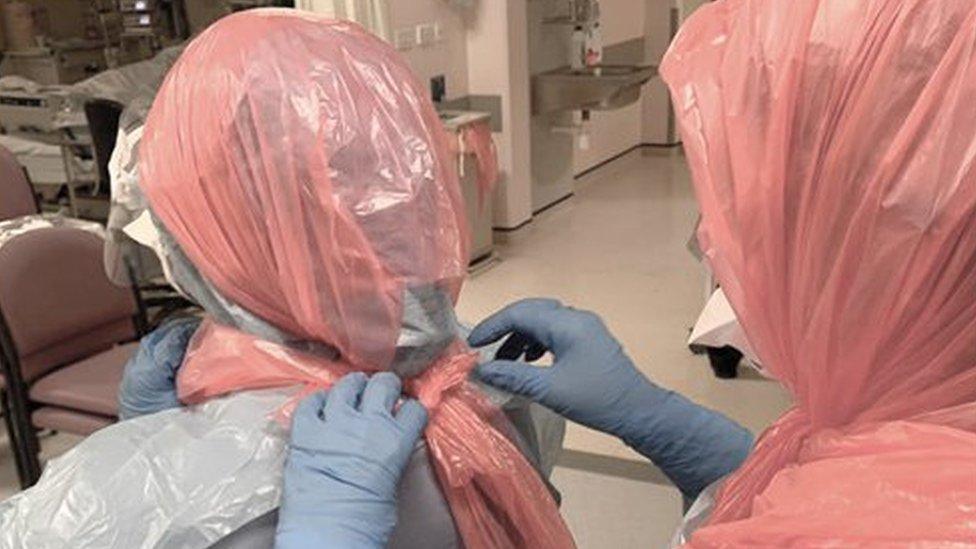
- Published11 April 2020
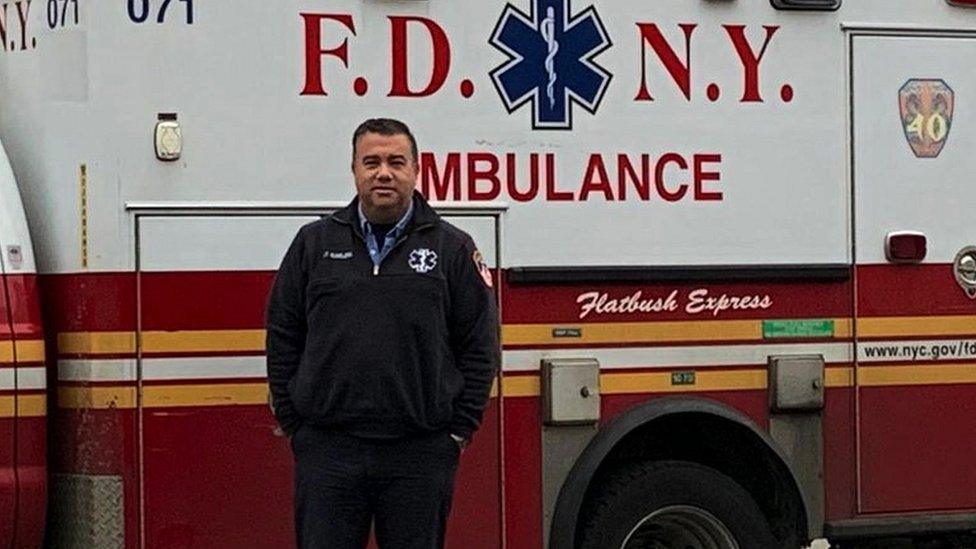
- Published6 April 2020
